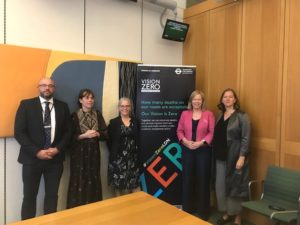This week is Vision Zero week in London, and Transport for London (TfL) has published casualty statistics that show the number of people tragically killed on London’s roads in 2021 fell by 22 per cent to the lowest level on record, compared to a seven per cent increase nationally. Despite this decrease, overall casualties have increased since the coronavirus lockdowns ended and traffic has returned, and continued action is needed to achieve the Mayor’s Vision Zero goal of eliminating death and serious injury from the transport network.
The devastating consequences for the families, friends and communities impacted by these deaths and life-changing injuries is immense and collective action is needed to achieve the Mayor’s Vision Zero goal of eliminating death and serious injury from London’s streets by 2041. RoadPeace is supporting Vision Zero week, organised by TfL and supported by the Metropolitan Police, London boroughs and the Mayor and we are working together to highlight the problem of road danger and the trauma caused by collisions, and generate awareness of Vision Zero across all Londoners.
As part of Vision Zero Week, RoadPeace attended a Parliamentary Reception for London MPs hosted by Ruth Cadbury MP, who also Chairs the Transport Select Committee. RoadPeace member Mandy Garner shared this powerful and moving testimony of her experience following the tragic death of her daughter Anisha, who was killed in a crash in February 2020:
“I wanted to start by saying a little about my daughter Anisha because I feel she has often been absent from the whole legal process that we have been caught up in for so long and a road death is, after all, about someone losing their life. Anisha was 20 and in her first year studying philosophy and Spanish at King’s College. She was a beautiful person in every single way. She has three siblings and she was, although not in any bossy sense, the leader of the team. Everything she loved we all loved because her enthusiasm for it was overwhelming. She was incredibly witty and smart with a broad knowledge of culture. She was not fussy in what she read or watched or listened to – from cartoons to obscure Italian 1960s art movies. She absorbed it all. She did one philosophy essay on whether the Sugababes are still the Sugababes if none of the original members are in the band. She always looked for the best in people. She went out of her way to make people feel better about themselves. Her boss at the cafe where she worked remarked that she was ‘effortlessly adorable’. Her little brother Gael wrote: “Anisha is a truly spectacular person. She’s smart, funny and caring. She’s always there for you and never won’t be. She is loved no matter what. Her love is endless. She is an immortal, and that’s what she deserves.”
On 19th February 2020 Anisha, her boyfriend Rory and his friend Liam arrived at Brixton tube station having met up in central London. They got on the bus on their way to a club and then got off to get some money from the cashpoint on Brixton Hill. Anisha had got to the middle of the road when a car came out of nowhere driving at great speed on both sides of the road and through two red lights. She tried to jump back, but the car swerved into her. She died instantly. The driver did not stop. He only handed himself in 48 hours later after speaking to his father – a barrister – and after the police went to his and his father’s house, thus avoiding a test for alcohol or drugs [he had a previous conviction for driving under the influence of drugs].
He pleaded guilty – he was caught on CCTV so what else could he do? – and immediately got a third off his sentence for doing so and saving court time. Twice he refused to leave his cell to come to court to be sentenced and was sentenced in absentia with only us in court to witness it. Both Rory and I had written impact statements to read in court – to read to him so that he understood the impact of his actions and who Anisha was. That for me was a major part of his sentence.
He got 10.5 years – the maximum sentence for death by dangerous driving is 14 years [one asks how much more dangerous one needs to drive to get the full sentence – he could have killed several people. Anisha’s boyfriend and friend could have easily been killed as well. The driver was heading down to the busy Brixton tube station]. He will be out next year. He applied to be moved to an open prison around six months after he was sentenced, which is where he is now. The law is being changed to allow for a life sentence, but, as we have seen, one thing is the law; another is its implementation.
It transpired that the driver had been flagged by an unmarked police car moments before he hit Anisha because he had been driving dangerously for some time beforehand. He slowed down, but then when a gap opened in the traffic he took off. So we had to wait a year for an independent police report which was basically a long debate on the difference between the words pursue and follow. Because he was sentenced and there was an independent police report we were told by the coroner’s office – and only when I asked for an update a year later – that the inquest had been closed. Nothing more could be learned from her death.
I have spent the last two years writing impact statement after impact statement to find out exactly what happened, given the sentencing was short and bizarre with the person who killed her not even there. As a mother, I had to know – it was the last thing I could do for Anisha – and I wanted to see if there was anything that could be done to stop such crimes happening again.
I now know that stretch of road has been the site of several serious accidents in the last five years, including at least one other fatal one. In my imagination I thought the road was a wide one. In fact, it is just two lanes. Anisha was seconds from safety.
And yet, it was as if no one cared to look at what could be learned from what happened. After going through traffic campaign groups, I contacted the local council and after several months found that there had been a meeting with councillors, the police and the coroner to decide that the accident was such a criminal act that effectively nothing could be learned from it. No-one bothered to tell us about this meeting. In fact, the coroner, when he told us that the case was closed, said ‘you may know that the driver has been sentenced’ as if we would not even care enough about what happened to Anisha to follow it up. Since then I have visited the police station in Catford – in March this year – to see the files and understand a bit more about what happened in the absence of an inquest. I had to instigate all of this.
And that is why I am here today because if there is anything I can do to stop this happening to one other family I will do it. The impact of Anisha’s death will last all of our lives and beyond. Death by dangerous driving is hugely traumatic, which is something that organisations like Road Peace are so good at acknowledging. Their role is absolutely vital. It is as if I am reliving every day the trauma of that moment. I wake up suddenly, violently, hearing the sound of knocking on the door even two years on. Our children are going through this too in their own ways. Yet there is very little – if any – recognition of this legally. There is so much that is wrong with the justice system in this country – the laws are outdated, the process is a game in which the victim’s family is a bystander, the victim’s family is forced to make endless impact statements and to relive things constantly. It is a form of mental torture and it makes things worse, if that is possible.
It is the cumulative effect of it all that is so damaging and so exhausting and I don’t think that is acknowledged in any way. I hope I can in some small way highlight the terrible and ongoing impact of road deaths and the inadequate way we as a society currently respond. Surely it make sense to get everyone involved together to work on prevention and who has more of an interest than the victim’s family? We may have lost the person we loved, but we surely don’t want it to happen to anyone else. Yet all too often it seems that we are excluded and have to fight a system that doesn’t recognise us all on our own. I hope that events like this are a start to including the voices of victim’s families more.”

From left to right, Dan Card, Mandi Garner, Lilli Matson, Ruth Cadbury MP, Fleur Anderson MP
The meeting also heard from Dan Card, Head of Roads Policing for the Metropolitan Police and Lilli Matson, Chief Safety Health and Environment Officer from Transport or London who both spoke about what they are doing to support Vision Zero.
You can read Transport for London’s full press release here: https://tfl-newsroom.prgloo.com/news/tfl-press-release-number-of-people-killed-on-londons-roads-in-2021-fell-to-the-lowest-level-on-record-but-collisions-have-increased-as-lockdowns-ended
Updated on: 29 June 2022
